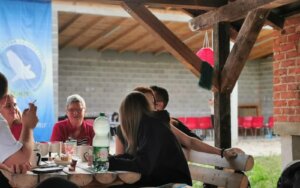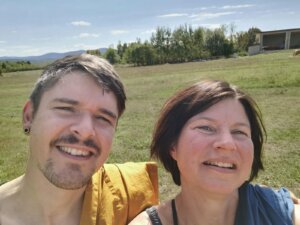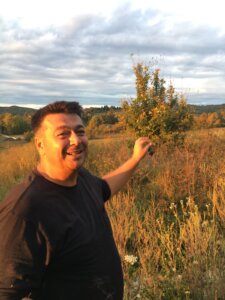From my notes. Luis Padberg.
14.09.2021 – On the plane to Sarajevo
Flying always has a special effect on me. The moment of takeoff releases a powerful feeling—somewhere between euphoria, reverence, and awe. Today I captured it all on video—for the kids—and while speaking, I was nearly brought to tears. I felt deeply moved, as though I were speaking directly to my children, who are now at Amin’s or in school.
The plane is taking me away from them, and from the wonderful Manu who’s watching over them and whom I trust completely. This physical departure, combined with the act of speaking to them, holds a strange, powerful tension.
I’m really looking forward to being on the road—also to being alone—and to meeting new people and environments. I’m curious about fresh impressions, moving moments, and the experience of myself. I want to step outside my cozy comfort zone and go through challenging, demanding situations to work through pain and grief. I want to practice mindfulness and consciously live in the now. I want to share genuine joy and celebrate life. However things unfold—it’s exactly as it should be.
Sadness and fear of emptiness… What if there’s nothing beyond this? No meaning, no hope, no promise of fulfillment. Loneliness even in the presence of others.
Healing and redemption can only grow within myself. Warmth and attention, tenderness toward my own soul.
16.09. Sarajevo – On the ground in front of some church, testifying with Monika
Yesterday, I so badly wanted to cry and scream. To feel and release the grief, the horror, and the pain of the mothers of Srebrenica. But nothing came. I could only cover my face with my hands and freeze in disbelief. Why can’t I cry?
Our kind guide Adi—he knew so much and shared his knowledge with such joy. I also sensed that he enjoyed our curiosity and our questions. And yet, there was something in his reactions when we told him things. For instance, when Monika spoke to him about Vahidin and the Peace Camp, something in his expression felt like a wall going up. Was it disinterest, perhaps from guiding chatty tourists through Sarajevo every day? Or a refusal to engage with certain topics? Or is it presumptuous of me to interpret all that into a look?
Heading out on my own last night was important. Just walking up the hill without knowing where I’d end up, then standing above the illuminated city on that old bastion, surrounded by the calls of the muezzins, wind in my face—it felt elevating, almost purifying. Then, surreal: running into a German school class on what seemed like their final trip, with a teacher worried his students might fall from the wall. I found it moving to see that teachers bring their classes here. The interaction between the class and the teacher was warm and inspiring.
17.09. Sanski Most – Peace Camp
Sunlight passes through a plastic bottle, filtered invisibly by the transparent liquid, and focuses on the carpet. A bright spot appears, like a magnifying glass. Will the fibers of the carpet eventually begin to smolder?
Bosnia feels like a magnifying glass too. Different cultures and religions densely packed into a small space. Vahidin said yesterday that the mix is no longer the same as before the war: Serbs, Bosniaks, and Croats now live isolated from one another in separate towns and communities. This surely leads to more alienation—stereotypes and prejudice fed by propaganda, growing stronger. In that sense, the war, though it had no winners, was “successful” in its twisted logic. One could draw war itself as a giant machine that perpetuates itself simply by existing—fueled, steered, and chosen by lost souls. Will that machine ever stop?
17.09., 11:25 PM – Sanski Most
I’m sitting under the roof at a table. Next to me are Marcos, Amira, and a girl whose name I’ve forgotten. They’re chatting in Bosnian.

Just a roof, some wooden pillars, some large tables and some smaller ones: To meet. Stare into the air. Have coffee. Eat, talk, sing together. Play cards…
It’s been a day full of experiences, with many moments of stillness and connection. In the morning, we gathered on the Bina (a raised, carpeted platform) to set the tone. We walked together to the vegetable garden and worked in silence, planting garlic. It was hard for the teenagers to remain quiet, but within me there was a calming stillness. Then the rain “surprised” us, and we moved under the roof, drinking that sweet, dark Bosnian coffee. Juliane, Vahidin, Monika, and I talked.
After the rain stopped, Katrin, Juliane, and I walked with Selko to the Sana River, and Katrin and I jumped into the icy water. When we returned, a circle began, led by Vahidin, addressing the problems of humanity and our own countries. After classifying the issues, we discussed possible solutions. Juliane’s contribution inspired me deeply. I think her concept was called something like “Restorative Relationships”: by positively engaging with our environment and those around us, we already begin to change things.
The experience of shared values, joy, and silence gives us strength and inspiration for daily life. We’re bringing something back home with us.
It’s powerful to see how differently the youth here cope with their country’s situation. Milena, for example, seems sad and frustrated. Amar said he sometimes loses hope because he sees no change. It breaks my heart to see young people without hope. At the same time, it’s essential to understand what life is like here—just two hours by plane from Bonn, a place of abundance.
19.09. Bina, Sanski Most
Fog. A thick, opaque soup clings to the hills. Spider webs catch the moisture from the air.
Last night, during a short evening walk, we stood on this perfectly idyllic meadow. The moon had just risen, the sky cloudy but full of gaps revealing stars and occasionally the moon. I felt I was witnessing pure beauty. I thought about the thousands of such meadows in this region. Katrin said she felt safe, as if God had placed a protective hand over the land.
Yet suddenly, I had a different image: Chetniks with rifles sweeping the meadow and surrounding woods, hunting for (in)nocent victims in hiding. I stood like an observer and asked myself, do I need to hide too?
I remembered Monika’s technique: inhale darkness, pain, and negativity for four breaths; exhale light, transforming it into small white clouds for eight breaths. I visualized my heart and soul as a white blossom on a dark pond, sheltered beneath a golden, expansive dome. It helped immensely. I had the realization that we have the power to change reality—through our positive energy.
Later, Katrin and I played cards with Mila, Yusuf, and Selko. “Jebko te tschatscha!”
Here, joy and sorrow live side by side. The others sang Bosnian songs and danced—with a passion and energy I’ve never seen in Germany (especially without alcohol). Some had tears in their eyes. It was melancholic, but also free and soulful—deeply touching and reflective.

Timka Omanovic, Vahidin’s wonderful spouse, gives instructions on the „Bima“ – a podium with a roof.
20.09. Sanski Most
Gentle raindrops on the metal roof form a soft, steady murmur. Larger drops fall from the roof onto a plastic tarp—like the crackle of a fire. Occasionally, a single drop hits something metallic, producing a hollow, resonant sound. I imagine cowbells. Sheep grazing in the rain. These sounds pull me into the moment, lend it a serene, powerful depth, and offer tenderness.
21.09. Hotel Saraj, Sarajevo – Closing Circle
What have I learned? How can I let it bear fruit in my life?
I’ve felt the strength to transform negative thoughts and energy into something positive. I’ve realized that we humans have the capacity and the power to act in transformative ways. I’ve felt the depth of the present moment and the strength of a group that opens up to each other. I’ve learned a little Bosnian. I’ve learned that hatred and mistrust can destroy everything—even relationships that once seemed solid and unquestionable. I’ve learned that even such wounds can be forgiven, out of love for oneself. I’ve discovered how helpful a structured morning can be: silence, writing, movement. I want to carry that home with me.
The Center for Peacebuilding and Vahidin’s work have shown me so clearly what’s lacking in Germany too: exchange, shared experiences in diverse groups, and rituals that create a sense of identity. I want to sing more. I want to connect people and foster peace in some way. Bonn in transition?
Katrin wrote: “We are responsible for ourselves and what we do. Everything is seen. Look closely. Be present—even when it hurts.”


